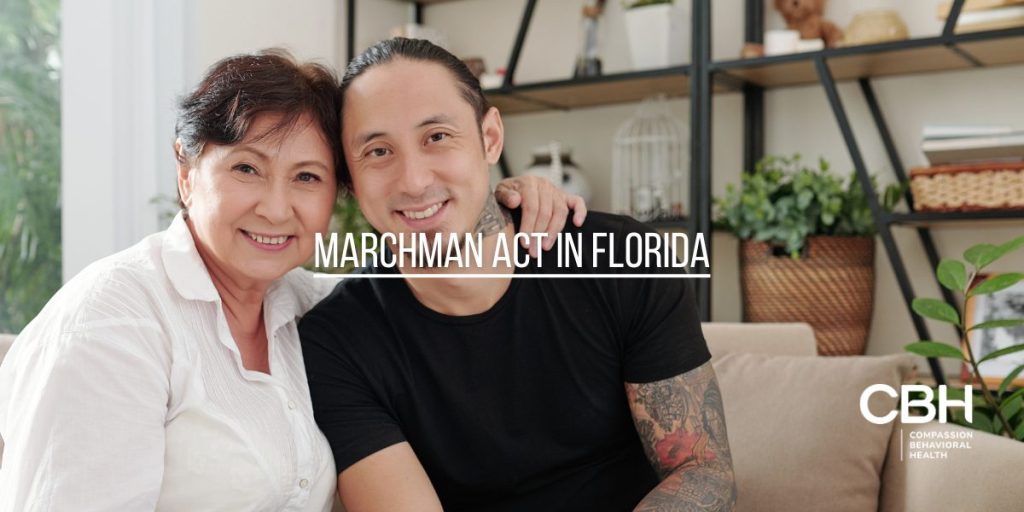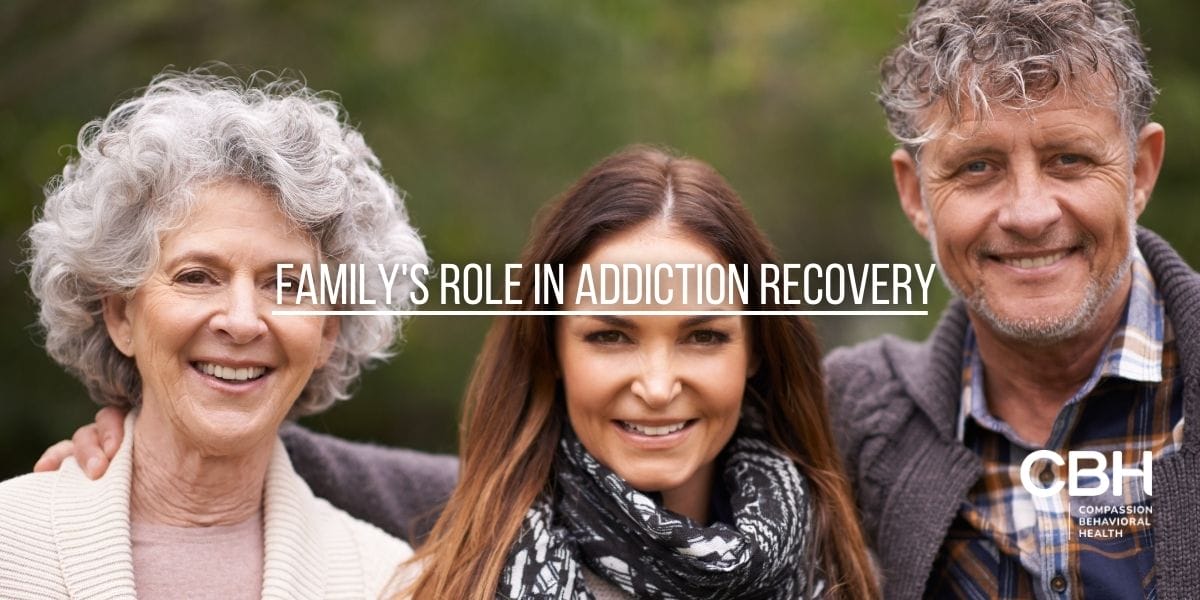Also known as the Hal S. Marchman Alcohol and Other Drug Services Act (1993), the Marchman Act is a statute used in the State of Florida to help concerned loved ones stage an intervention and enforce mandatory drug rehabilitation on behalf of a substance abuser who is reluctant to seek help. It can be exercised by family members for relatives aged over 18.
What is The Marchman Act In Florida?
With over 3,100 drug-induced deaths per year, studies show that Florida’s drug problems are worse than the national average. In fact, residents in the Sunshine State are more likely to die from drugs than road accidents or firearms. Moreover, drugs and alcohol abuse can destroy people’s lives without causing death due to health complications, broken relationships, and financial difficulties attributed to a dependence on their chosen substance.
However, many drug abusers won’t seek help and don’t want to admit that they have a problem. The Marchman Act in Fort Lauderdale and the rest of Florida is designed to help addicts get the support they need, even when it is involuntary.
Research shows that only 1 in 5 Americans who need substance abuse treatments actually receive the necessary support. Laws like the Marchman Act aim to improve those figures by giving concerned family members the authority to legally force a loved one to enter drug rehab treatment. After a judge has passed the petition, refusing to seek treatment can lead to legal repercussions. So, it is a very effective strategy for encouraging admissions.
Here at Compassion Behavioral Health, we offer a comprehensive service to families who need to exercise the Marchman Act after failing to get their loved one to sign up voluntarily. Of course, we can subsequently provide the necessary treatments for a wide range of addictions.

Why Would You Marchman Act A Loved One?
The thought of using the Marchman Act may seem like a drastic measure, especially as failure to complete treatment plans enforced by the courts could lead to jail time. However, almost a quarter of a million Americans are sent to jail for drug-related crimes each year. Besides, the failure to take action through a legal intervention could potentially lead to even worse outcomes than incarceration.
There are many reasons why using the Marchman Act may be necessary, including but not limited to;
- You have run out of alternatives as your loved one continues to resist rehabilitation services.
- Introducing the potential threat of legal repercussions will get the addict to finally see the severity of the situation.
- Taking action rather than just threatening it shows an addict that loved ones are genuinely concerned.
- It can lead to treatment starting in as little as 10 days, finally helping the individual get their life back on track.
- Your loved one will need to complete the full program, which gives them a far better chance of staying sober.
Above all else, you know that your troubled loved one will thank you in the long run. As well as being highly effective, it can lead to action far sooner than alternative solutions.
Signs That The Marchman Act Should Be Used
The Marchman Act should be used whenever your loved one meets the Marchman Act criteria and you are worried about them. Individuals fighting substance addiction could come from any background too. While over 29% of all admissions are people in their 20s, it should be noted that all age groups are represented with 7.5% coming from the 12-17 category and nearly 2% coming from the over 60s. Signs that someone in your life needs help include;
- They lie about their substance usage,
- Their substance usage has caused financial problems,
- They have withdrawn from other hobbies,
- Their health and safety have been compromised,
- They have undergone a personality change.
A judge may deny the petition if you cannot prove that your loved one meets the Marchman Act requirements if they are beyond help offered by rehab centers, or it is deemed that it’s unlikely they’ll be able to pay. In legitimate cases, though, the courts will pass the Marchman Act as it is in the best interests of the individual who needs that support.
If your petition is successful, the Marchman Act can be the first step to helping your loved one get the support they need. Compassion Behavioral Health’s team of dedicated experts can provide a range of bespoke outpatient services for; Alcohol addiction, Amphetamine addiction, Benzodiazepine addiction, Cocaine addiction, Heroin addiction, Opioid addiction, and Sedative addiction.

Who is Eligible for the Marchman Act?
Eligibility for the Marchman Act is primarily determined by the individual’s state of impairment due to substance abuse. The law outlines specific criteria that must be met for a petition to be filed. Understanding these criteria is essential for families and friends who are considering this option. It is crucial for loved ones to recognize the signs of substance abuse, as early intervention can significantly improve the chances of recovery and long-term sobriety.
Criteria for Filing a Petition
To file a petition under the Marchman Act, the following conditions must generally be met:
- The individual must be an adult (18 years or older).
- The individual must be suffering from substance abuse impairment.
- The impairment must pose a danger to the individual or others.
- The individual must be unwilling or unable to voluntarily enter treatment.
These criteria ensure that the Act is used judiciously and that individuals who truly need help are given the opportunity for intervention. It is important to note that the process is not intended to criminalize those struggling with addiction but rather to provide them with the necessary support. The Marchman Act serves as a vital resource for families who may feel helpless in the face of a loved one’s addiction, offering a structured approach to securing treatment when voluntary options have been exhausted.
Additionally, the Marchman Act emphasizes the importance of a comprehensive evaluation by qualified professionals to assess the individual’s condition accurately. This evaluation can help determine the severity of the substance abuse and the appropriate level of care required. Families should also be aware that the process may involve court hearings, where evidence of the individual’s impairment and the risks associated with their substance use will be presented. The goal is to create a supportive environment that prioritizes recovery while respecting the rights of the individual, ensuring that they receive the help they need in a compassionate and effective manner.
How to Marchman Act on Someone
The Process of Filing a Petition
Filing a petition under the Marchman Act involves several steps, each designed to ensure that the individual’s rights are respected while facilitating access to treatment. Understanding this process can help families navigate the complexities of the law.
Step-by-Step Guide to Filing
The following steps outline the process for filing a petition:
- Consultation with Professionals: Before filing, it is advisable to consult with a qualified attorney or substance abuse professional who can provide guidance on the process.
- Gathering Evidence: Collect documentation and evidence of the individual’s substance abuse, including medical records, witness statements, and any previous treatment attempts.
- Filing the Petition: Complete the necessary forms and file the petition with the appropriate court. This usually involves submitting a sworn affidavit detailing the individual’s condition.
- Court Hearing: Attend the court hearing where a judge will evaluate the evidence and determine whether to grant the petition for involuntary treatment.
- Treatment Plan: If the petition is granted, the court will order an assessment and recommend a treatment plan tailored to the individual’s needs.
Each step is crucial in ensuring that the process is fair and just, allowing for the best possible outcome for the individual in need of help.
It is important to note that the Marchman Act is designed to balance the need for treatment with the rights of the individual. The process is not intended to be punitive but rather to provide a pathway to recovery. Families often face emotional challenges during this time, as they may feel a mix of hope and anxiety about the outcome. Engaging with support groups or counseling services can be beneficial, as they offer a space to share experiences and gain insight from others who have navigated similar situations.
Additionally, the involvement of legal professionals can significantly impact the process. An attorney experienced in handling Marchman Act cases can help ensure that all necessary documentation is correctly prepared and submitted, as well as represent the family’s interests during the court hearing. This legal support can also help families understand the potential implications of the treatment plan and any follow-up actions that may be required to support the individual’s recovery journey.
Rights of Individuals Under the Marchman Act
While the Marchman Act facilitates involuntary treatment, it also safeguards the rights of individuals undergoing this process. Understanding these rights is essential for both the individuals affected and their families. The Act aims to balance the need for treatment with the fundamental rights of individuals, ensuring that their voices are heard even in challenging circumstances.

Key Rights Under the Act
Individuals subject to the Marchman Act have several fundamental rights, including:
- The right to be informed of the nature of the proceedings.
- The right to legal representation.
- The right to present evidence and witnesses on their behalf.
- The right to appeal the court’s decision.
These rights ensure that individuals are treated with dignity and respect throughout the process, promoting a fair approach to treatment and recovery. Additionally, individuals have the right to receive timely and appropriate medical care during their treatment, which is crucial for their physical and mental well-being. This includes access to necessary medications, therapy sessions, and support services tailored to their specific needs. Families are encouraged to be actively involved in the treatment process, as their support can significantly enhance the chances of successful recovery.
Moreover, the Marchman Act emphasizes the importance of confidentiality. Individuals have the right to have their treatment records kept private, protecting their personal information from unauthorized disclosure. This confidentiality is vital, as it fosters a safe environment where individuals can openly discuss their struggles without fear of judgment or repercussions. The Act also mandates that individuals be treated in the least restrictive environment possible, promoting their autonomy and encouraging a sense of agency in their recovery journey.
Understanding the Treatment Process
Once a petition is granted under the Marchman Act, the individual is typically required to undergo an assessment and subsequent treatment. This section will explore what to expect during this process.

Assessment and Treatment Options
The assessment process is crucial in determining the appropriate course of treatment. This evaluation typically includes:
- A comprehensive review of the individual’s substance use history.
- Medical and psychological evaluations to identify co-occurring disorders.
- Recommendations for inpatient or outpatient treatment based on the severity of the addiction.
Following the assessment, treatment options may include:
- Inpatient rehabilitation programs, which provide intensive support in a controlled environment.
- Outpatient treatment programs, allowing individuals to maintain some level of independence while receiving care.
- Counseling and support groups, which are essential for long-term recovery.
Inpatient rehabilitation programs often last anywhere from 28 days to several months, depending on the individual’s needs and progress. These programs are designed to remove individuals from their usual environment, which can be filled with triggers and temptations. During their stay, patients engage in various therapeutic activities, including individual therapy, group sessions, and holistic approaches such as yoga or art therapy. The goal is to provide a safe space where individuals can focus solely on their recovery without the distractions of daily life.
On the other hand, outpatient treatment programs offer flexibility, allowing individuals to attend therapy sessions while still managing work or family responsibilities. These programs often involve regular check-ins with counselors and may include participation in group therapy sessions. The structure of outpatient care can vary widely, with some programs offering intensive support several times a week, while others may provide less frequent visits. This approach is particularly beneficial for those who have a strong support system at home and are motivated to maintain their recovery journey in a less restrictive setting.
Challenges and Considerations
While the Marchman Act offers a pathway to treatment, there are challenges and considerations that families and individuals should be aware of. Understanding these can help in navigating the complexities of the process.
Potential Challenges
Some of the challenges associated with the Marchman Act include:
- Emotional strain on families during the intervention process.
- Resistance from the individual, which can complicate treatment efforts.
- The need for ongoing support and resources post-treatment to prevent relapse.
Recognizing these challenges can help families prepare for the journey ahead and seek additional support when needed.
Resources for Support and Information
For families and individuals seeking assistance with the Marchman Act, numerous resources are available. These can provide guidance, support, and information throughout the process.
Helpful Resources
- Florida Department of Children and Families: Offers information on substance abuse services and treatment options.
- Local Support Groups: Organizations such as Alcoholics Anonymous (AA) and Narcotics Anonymous (NA) provide community support and resources.
- Legal Assistance: Consulting with attorneys who specialize in addiction law can provide clarity on rights and processes under the Marchman Act.
Utilizing these resources can empower families and individuals to make informed decisions and navigate the complexities of addiction treatment effectively.
Conclusion
The Marchman Act serves as a vital tool for families seeking to help loved ones struggling with substance abuse. By understanding its provisions, processes, and implications, individuals can better navigate the challenges of addiction and recovery. While the journey may be fraught with difficulties, the Marchman Act provides a pathway to intervention and treatment, emphasizing the importance of compassion and support in the recovery process.
For those considering the Marchman Act, it is essential to consult with professionals who can provide guidance tailored to individual circumstances. Recovery is possible, and the Marchman Act is a step toward healing and hope.
Alcohol and Drug Addiction Treatment at CBH in Florida

If you or a loved one is grappling with the challenges of substance abuse and you’re considering the Marchman Act as a step towards recovery, Compassion Behavioral Health is here to offer the support and guidance you need. Our customized approach to mental health and substance use treatment is designed to foster sustainable recovery through various levels of care, tailored to your unique situation. Our team of experts at our Hollywood rehab center is committed to helping you achieve your highest physical and mental health. Conveniently located in South Florida, we are a beacon of hope for those ready to take back their lives. Call Us Today and let us be a part of your journey to healing and hope.
Marchman Act in Florida FAQ
While a judge’s discretion is central to any hearing, the Marchman Act criteria is fairly simple. If the petitioned individual is unable to stop taking drugs and has attempted self-harm or become unable to make logical decisions about rehab, the petition will be passed.
In most cases, parents won’t need to use the Marchman Act to enforce an intervention for a child aged under 18. However, in situations where a hearing is required, the minor will be entitled to representation via a court-appointed attorney.
While each Marchman Act is different, most will begin with testimonies from the individual(s) who want an involuntary assessment to be completed on the petitioned substance abuser. The judge will then determine whether (and when) an assessment and treatment should occur.
Once the appropriate Marchman Act forms have been completed and submitted, the hearing should be arranged within 10 days. Assuming the judge agrees to your petition, the Marchman Act order can be served by local law enforcement teams with immediate effect.
The Marchman Act is only used in Florida (although most states have comparable schemes) but does require you to complete the petition and hearing before drug rehab can be enforced. We help with Marchman Act Miami Dade and Marchman Act Fort Lauderdale cases in style.
The Marchman Act is used for involuntary substance abuse treatment, while the Baker Act is for involuntary mental health evaluations when someone is a danger to themselves or others due to mental illness.



